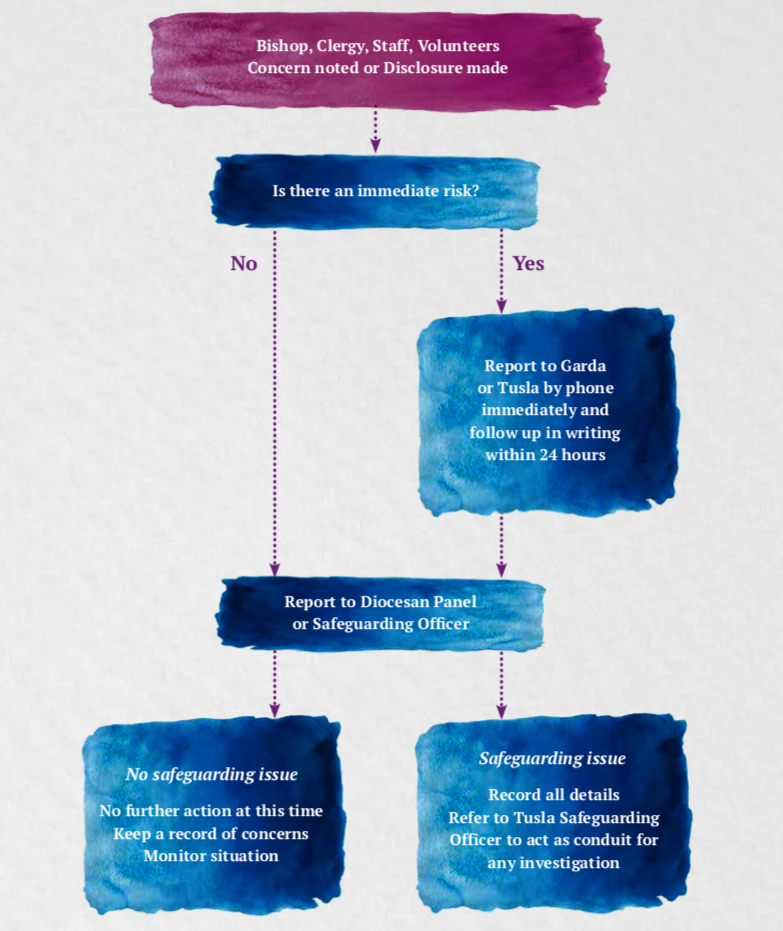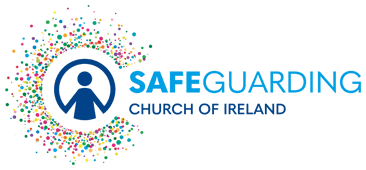ROI Adult Safeguarding
SECTION F: Recognising & responding to Adult Safeguarding Concerns
Jump to section:
- Responding to Disclosure of Possible Abuse
- Safeguarding Officer Role
- Diocesan Adult Safeguarding Panel
- Reporting Procedures for Concerns about Adults who may be at Risk of Harm and/or in Need of Protection
- Recording Concerns and Storage of Information
- Confidentiality
- Consent and Capacity
- Raising a Concern about someone in a Position of Trust in the Church
- How the Church will Respond
Bishops, clergy or volunteers who are concerned about someone who may be experiencing harm or abuse must promptly report these to Diocesan Adult Safeguarding Panel or the Safeguarding Officer (RI).
There are a variety of ways that you could be alerted that an adult is suffering harm:
- They may disclose to you
- Someone else may tell you of their concerns or something that causes you concern
- They may show some signs of physical injury for which there does not appear to be a satisfactory
or credible explanation - Their demeanour/behaviour may lead you to suspect abuse or neglect
- The behaviour of a person close to them makes you feel uncomfortable (this may include a staff
member, volunteer, peer or family member); or - Through general good neighbourliness and social guardianship
Being alert to potential abuse plays a major role in ensuring that adults are safeguarded and it is important that all concerns about possible abuse are taken seriously and appropriate action is taken.
Responding to Disclosure of Possible Abuse
In cases where an adult discloses abuse to a bishop, member of the clergy, member of staff or a volunteer, it is vital that they know how to react appropriately.
All bishops/clergy/staff/volunteers should be made aware of to the following guidelines:
Do
- Stay calm
- Listen attentively
- Express concern and acknowledge what is being said
- Reassure the person – tell the person that s/he did the right thing in telling you
- Let the person know that the information will be taken seriously and provide details about what
will happen next, including the limits and boundaries of confidentiality - If urgent medical/police help is required, call the emergency services;
- Ensure the immediate safety of the person
- If you think a crime has occurred be aware that medical and forensic evidence might be needed.
- Consider the need for a timely referral to the police service and make sure nothing you do will contaminate it
- Let the person know that they will be kept involved at every stage
- Record in writing (date and sign your report) and report to the person in charge/Safeguarding
Officer at the earliest possible time - Act without delay
Do not
- Stop someone disclosing to you
- Promise to keep secrets
- Press the person for more details or make them repeat the story
- Gossip about the disclosure or pass on the information to anyone who does not have a legitimate
need to know - Contact the alleged person to have caused the harm
- Attempt to investigate yourself
- Leave details of your concerns on a voicemail or by email
- Delay
The Diocesan Adult Safeguarding Panel or the Safeguarding Officer (RI) will take any immediate action required to ensure the vulnerable adult is safe and make a decision as to when it is appropriate to speak with the adult themselves about the concerns and any proposed actions. They must then report the concerns and any action taken to the social services.

Safeguarding Officer
The role of the Designated Officer is set out in ‘Safeguarding Vulnerable Persons at risk of Abuse’. The Designated Officer for the Church of Ireland is the Safeguarding Officer (RI). Contact details can be found at https://www.ireland.anglican.org/about/safeguarding
The Safeguarding Officer (RI), with the support of the Church of Ireland Safeguarding Board, provides strategic leadership, advice and oversight in relation to adult safeguarding and is responsible for supporting dioceses in ensuring the implementation of this Code of Good Practice. The Safeguarding Officer (RI) is also the main point of contact with HSE and the Garda for all adult safeguarding matters.
The Safeguarding Officer (RI) is responsible for:
- Receiving concerns or allegations of abuse regarding vulnerable persons
- Ensuring the appropriate persons are informed and collaboratively ensuring necessary actions
are identified and implemented - Ensuring reporting obligations are met
All concerns/reports of abuse must be immediately notified to the Safeguarding Officer and in the event of their unavailability to the Diocesan Adult Safeguarding Panel.
Diocesan Adult Safeguarding Panel
The panel will be appointed by the Bishop subject to approval by Diocesan Council. This should be composed of a senior cleric plus two others, with at least one lay member. The panel as far as is practical should comprise persons of different gender. The Adult Safeguarding Panel will work closely with the Safeguarding Officer (RI).
Adult safeguarding issues should not go through the Safeguarding Trust Child Protection Parish Panels but through the Diocesan Adult Safeguarding Panels.
All reports will need to be made to central Safeguarding Officer (RI).
Any cleric, staff member or volunteers may make a report to the Diocesan Adult Safeguarding Panel or to the Safeguarding Officer (RI). The Diocesan Adult Safeguarding Panel will then report to the Safeguarding Officer (RI).
Reporting Procedures for Concerns about Adults who may be at Risk of Harm and or in Need of Protection
It is important to remember that the safety and well-being of adults at risk must be the paramount consideration in any incident and such vulnerable individuals or groups should never be put at further risk of harm by delay or inaction. The Church has a responsibility and will pass on safeguarding concerns to the civil authorities even when it does not concern church personnel directly.
- When a concern is noted the information should be raised with the Diocesan Adult Safeguarding Panel or the Safeguarding Officer. REMEMBER IT IS NOT YOUR ROLE TO INVESTIGATE. Contact details will be found on the relevant diocesan website and the Church of Ireland website https://www.ireland.anglican.org/about/safeguarding
- The Safeguarding Officer (RI) will determine if the matter should be referred to the HSE and / or the Garda.
- Arrangements should be in place to ensure that an absence of a delegated person does not delay reporting to HSE and/or the Garda where there are immediate safety concerns.
- Every safeguarding concern must be taken seriously. The safety and wellbeing of a vulnerable person must be paramount in every investigation and it is important that any actions taken or any delay or inaction does not place the adult at risk of further harm.
- It is important that the adult remains in control of their information and where they are able to give informed consent for a referral to be made that this is agreed.
- Whenever a concern is raised and it is possible and practical, take notes during the conversation. Always ask permission to do this and explain the importance of recording all information. Where it is not appropriate to make notes at the time, make a written record as soon as possible afterwards before the end of the day. It is important to sign and date this record.
- Explain to an adult raising a concern what will happen next. Indicate who will be made aware of the information given by them. Leave contact details of the Safeguarding Officer (RI) in case the referrer needs to ask questions later.
Recording Concerns and Storage of Information
Good record management standards and practices are required for the organisation to ensure confidentiality and that the security of adults’ information is respected.
An accurate record should be made of the date and time that the bishop/member of clergy/staff/ volunteer became aware of the concerns, the parties who were involved, and any action taken; for example, if first aid was administered. Any questions that bishop/clergy/staff/volunteers ask in ‘checking out’ the concerns should also be recorded verbatim.
The record should be clear and factual, and recorded at the time or as soon as possible thereafter. Information you have may be valuable to professionals investigating the incident and may at some time in the future be used as evidence in court.
Details of your conversations and actions should be recorded clearly and signed and dated by you.
Information recorded would normally include:
- As much information as possible about the circumstances that led to the concern/allegation being raised; the context of the conversation; any observations; who else was present etc
- The exact words of the individual who reported the concern; and specifically what the person is worried about and why
- Any explanation offered to account for the risk, injury or concern
- Details of any action already taken about the incident/concern/allegation
- Any views expressed by the individual or their carer(s) about the matter
- Detail which, to you, may seem irrelevant. It may prove invaluable at a later stage in an investigation
All original records must be passed immediately to the Safeguarding Officer (RI). Any copies of records retained must be kept secure and confidential.
All records may be needed in legal proceedings if required.
Confidentiality
Any notes or information held must be stored confidentially and in a secure place (including electronic filing) and shared only with those who need to know about the concerns, disclosures, allegations or suspicions of abuse. Further guidance for faith sector organisations on the management of records, confidentiality and sharing of information is available in the GDPR regulations document on the Church of Ireland Safeguarding website: https://www.ireland. anglican.org/about/safeguarding 4
Consent and Capacity
The focus of any intervention must be on promoting a proportionate, measured approach to balancing the risk of harm with respecting an adult’s choices and preferred outcome for their own life circumstances. The right of a person with capacity to make decisions and remain in control of their life must be respected. Consideration of ‘capacity’ and ‘consent’ are central to adult safeguarding; for example, in determining the ability of an adult to make lifestyle choices, such as choosing to remain in a situation where they risk being harmed or where they choose to take risks. There should always be a presumption of capacity to make decisions unless there is evidence to suggest otherwise; for example: when in a pastoral role you are aware that an individual has a diagnosis of dementia or a moderate to severe learning disability. However, there are also some circumstances when it may be necessary to consider the protection and rights of others, and overriding the withholding of consent may be necessary to ensure the protection of others. This decision will be made by the statutory services.
It is good practice for those involved in ministry to explain to a vulnerable person that they cannot keep a concern a secret and that there are agencies and organisations that are able to provide the adult with advice and support. Adults should be encouraged to agree with you having a conversation with the Safeguarding Officer to begin to offer support in a meaningful and respectful way that is cognisant of how they want to deal with their situation.
Where an adult who has capacity to make decisions refuses to give permission to report the concern it is important that this is noted and respected. The adult should be informed that their views are important and will be considered but that it is a pastoral responsibility to discuss the matter with the Safeguarding Officer to ensure the safety and wellbeing of others. This may include allegations of a criminal nature which must be reported to the HSE and/or the Garda.
Raising a Concern about someone in a Position of Trust in the Church – this includes all Clergy, Staff and Volunteers
All organisations that provide services for, or work with, adults at risk must have appropriate whistle-blowing procedures, and a culture that enables safeguarding concerns and allegations to be addressed. There should be particular awareness that the welfare of adults at risk is paramount. Whistleblowing as part of the safeguarding procedures is intended to encourage and enable anyone with a serious concern, to raise that concern.
People who work within the Church of Ireland, including but not limited to office holders, bishops, clergy, staff or volunteers, may find it difficult to speak out and raise their concerns as they may feel they are being disloyal to their colleagues or to the Church. They may also fear harassment or victimisation. Whistle-blowers are protected by law from victimisation, subsequent discrimination or disadvantage provided the matter in question is raised with genuine concern. The policy extends this protection to volunteers.
It is important that an individual raising concerns put his/her name to an allegation and does
not raise it anonymously. Where concerns are expressed anonymously they will be considered, however they are much less powerful and far more difficult to investigate and prove. Concerns can be raised in confidence. At the appropriate time, however, a whistle-blower may be approached to come forward as a witness, in order to bring the matter to a conclusion.
If an individual has any concerns that someone within the church is engaged in activities or behaviour that is contrary to any part of these safeguarding policies they should, in the first instance, contact the Safeguarding Officer (RI) or the Diocesan Adult Safeguarding Panel.
If an individual feels unable to contact the Safeguarding Officer (RI) or the allegation involves this person, then advice should be sought from the Bishop of the Diocese.
If an individual feels unable to contact a member of the Church of Ireland they can go directly to the HSE.
Concerns may be raised verbally in the first instance; however, this should be followed up in writing stating the history of the concern and providing as much detail as possible including any supporting evidence.
The earlier concerns are raised the easier it is to take action.
Whistleblowing
The Adult Safeguarding Policy runs in conjunction with the Church of Ireland Dignity in Church Life Charter, Safeguarding Trust for working with Children and all other Representative Church Body policies.
- The Church of Ireland is committed to the highest possible standards of conduct, openness, honesty and accountability
- The Church of Ireland takes poor practice or malpractice seriously, giving examples of the types of concerns to be raised, to endure that a whistleblowing concern is clearly distinguished from a grievance
- Bishops, clergy, staff or volunteers have the option to raise concerns outside of line management structures
- Bishops, clergy, staff or volunteers are enabled to access confidential advice from an independent source
- The Church of Ireland will, where possible, respect the confidentiality of a bishop, member of clergy, staff or volunteer raising a concern through the whistleblowing procedure
- It is a disciplinary matter both to victimise a bona fide whistleblower and for someone to maliciously make a false allegation
There may be situations in which concerns or allegations turn out to be unfounded. It is important that everyone in the organisation knows that if they raise a concern which, through the process of investigation, is not validated, they have not in any way been wrong in their initial action. Responsible action needs to be encouraged in the organisation and whistleblowers should be confident of support. The whistleblowing policy needs to be regularly reviewed to ensure the procedures work in practice. It is everyone’s duty to be vigilant in preventing abusive practice.
How the Church will Respond
The Church of Ireland gives an undertaking to minimise any risk to an individual raising a concern in good faith and will support them in doing so. It will not tolerate victimisation, intimidation or negative repercussion of anyone raising a concern in good faith and will take action as required.

